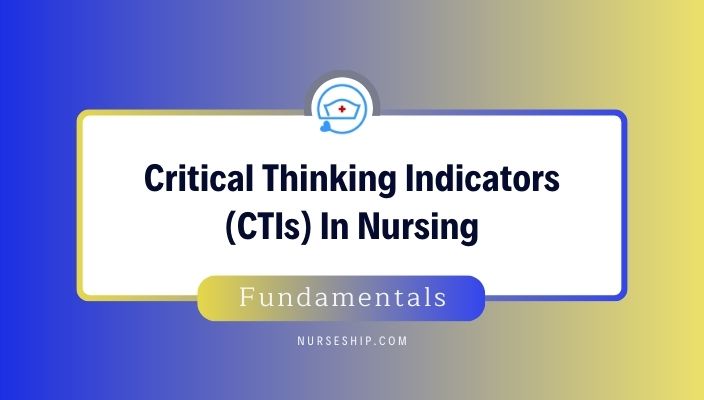In this article, we will explore key critical thinking indicators in nursing and provide examples of how these indicators manifest in real-world situations.
What are Critical Thinking Indicators?
Critical Thinking Indicators (CTIs) are traits or skills that demonstrate a person’s ability to think critically and analytically.
They provide insights into how someone approaches complex problems, evaluates information, and makes well-reasoned decisions.
Related:
15 Attitudes of Critical Thinking in Nursing (Explained W/ Examples)
What is Critical Thinking in Nursing? (Explained W/ Examples)
How to Improve Critical Thinking Skills in Nursing? (24 Strategies W/ Examples)
What are Critical Thinking Indicators (CTIs) in Nursing?
Definition of Critical Thinking Indicators (CTIs) in Nursing
Critical thinking indicators in nursing can be defined as the skills, traits, and behaviors that demonstrate a nurse’s ability to analyze complex situations, make informed decisions, and provide high-quality patient care.
CTIs are critical in the healthcare field, where nurses frequently face diverse and often urgent challenges that necessitate thoughtful and well-reasoned responses.
CTIs help nurses navigate the complexities of healthcare, adapt to changing circumstances, and ensure the best possible outcomes for their patients.
Related: What is the 4-Circle CT Model?
Critical Thinking Indicators (CTIs) in Nursing
Here are a few critical thinking indicators; take a moment to reflect on how many of these attributes manifest in your own behavior.
1. Self-Awareness:
Nurses who are self-aware acknowledge their biases and limitations, enabling them to provide objective care.
For example, a nurse might recognize their discomfort with a certain medical procedure and actively seek guidance from a colleague to ensure patient safety.
2. Genuine/Authentic:
Authentic nurses align their actions with their values, fostering trust and rapport with patients.
By demonstrating empathy and compassion, a nurse establishes a genuine connection with patients, which can significantly enhance the healing process.
3. Effective Communicator:
Effective communication is essential for nurses to understand patient needs and relay critical information.
A nurse who actively listens to a patient’s concerns and articulates medical instructions clearly ensures that patients are well-informed and empowered to manage their health.
4. Curious and Inquisitive:
Curiosity drives nurses to seek deeper understanding. When faced with a new treatment approach, a curious nurse might research alternative methods and consult with colleagues to explore innovative solutions for patient care.
5. Alert to Context:
Being attentive to changes in a patient’s condition is crucial. A nurse who notices a sudden change in a patient’s vital signs may investigate further to identify potential complications and take swift action.
6. Reflective and Self-Corrective:
Nurses who reflect on their actions and interactions can identify areas for improvement.
After a challenging shift, a nurse might review their decisions and consider seeking feedback from peers to enhance future performance.
7. Analytical and Insightful:
Analytical nurses identify patterns in patient data that might go unnoticed by others.
By recognizing a recurring symptom, a nurse can contribute to an accurate diagnosis and tailored treatment plan.
8. Logical and Intuitive:
Balancing logic and intuition is key. A nurse who uses both logical reasoning and intuition may suspect an adverse reaction to medication based on a patient’s sudden change in behavior, prompting timely intervention.
9. Confident and Resilient:
Confident nurses trust their abilities even in challenging situations. When a complex case arises, a nurse’s confidence can drive them to collaborate with the medical team to devise an effective care strategy.
10. Honest and Upright:
Honesty and integrity guide ethical decision-making. A nurse who acknowledges their own mistakes and takes responsibility fosters an environment of trust within the healthcare team.
See Also:
- What is Critical Thinking in Nursing? (Explained W/ Examples)
- Nursing Concept Map (FREE Template)
- Clinical Reasoning In Nursing (Explained W/ Example)
- 8 Stages Of The Clinical Reasoning Cycle
- How To Improve Critical Thinking Skills In Nursing? 24 Strategies With Examples
- What is the “5 Whys” Technique?
- What Are Socratic Questions?
Conclusion
Adopting these critical thinking indicators (CTIs) in nursing practice is essential for improving patient care and fostering transformative changes in the healthcare setting.
Recommended Readings
Critical Thinking Indicators (CTIs)
Critical Thinking, Clinical Reasoning, and Clinical Judgment: A Practical Approach
Applying Nursing Process: The Foundation for Clinical Reasoning




